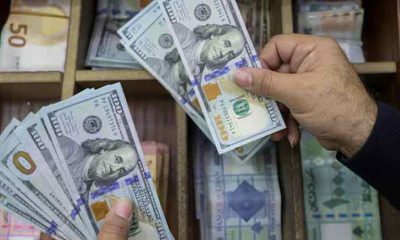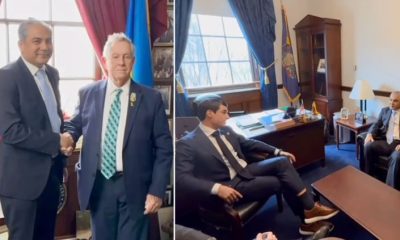Business
US terms Pak-Russia oil deal ‘a sovereign decision’

The United States has termed the recent oil deal between Pakistan and Russia a “sovereign decision” between the two states, saying the move doesn’t intend to pull Moscow “off the energy market”.
“One of the reasons that the United States, through the G7, has been a big proponent of the price cap is to ensure that steps are not being taken to keep Russian energy off the market because we understand that there is a demand for supply,” said US State Department spokesperson Vedant Patel in a news briefing on Tuesday.
He said, “But we also need to take steps to ensure that Russians – Russian energy markets are not turning out to be a windfall for Putin’s war machine.” “And so, again, countries will make their own sovereign decisions. We have never tried to keep Russian energy off the market.”
The statement comes after Pakistan placed its first order for discounted Russian crude oil under a deal struck between Islamabad and Moscow with one cargo to dock at Karachi port in May.
The deal will see Pakistan buy crude oil only, not refined fuels, and imports are expected to reach 100,000 barrels per day if the first transaction goes through smoothly, Minister for Petroleum Musadik Malik was quoted as saying. “Our orders are in, we have placed that already,” he said.
The minister said Pakistan Refinery Limited (PRL) will initially refine the Russian crude, with other refineries to be included later after a trial run.
Russian Energy Minister Nikolay Shulginov led a delegation to Islamabad in January to hold talks on the deal, after which he said oil exports to Pakistan could begin after March.
At the time, Shulginov also said Pakistan will pay for crude oil purchases in currencies of friendly countries.
“We have agreed that the payments will be made in the currencies of friendly countries,” he had said at a joint news conference with Pakistan’s Economic Affairs Minister Ayaz Sadiq back then.
He didn’t specify the ‘friendly countries’ and neither of the two ministers gave details on the size of the planned purchases.
Earlier, Malik had said that crude oil supply from Russia to Pakistan will start by the end of this month. Last year, Pakistan sent officials to Russia, after Malik said Moscow would sell crude oil at a discounted rate.
— Pakistan, Russia conclude second round of talks, negotiate payment mode —
Pakistan and Russia concluded the second round of talks over crude oil imports on April 15 this year, moving one step forward in deciding the mode of payment, sources claim.
Sources further claimed Russian crude oil is expected to arrive in Pakistan in May if the order was successfully placed. The two sides held talks in Karachi on April 13-15, but no official statement was issued by any of the side.
The sources said Russian delegates advised the Pakistani to stay away from the media regarding discount in crude oil price and mode of payment deal. The top functionaries decided not to disclose the mode of payment and the exact discount.
Earlier, the technical teams of the Operational Services Center (PSC), a Russian state-owned entity, held talks for two days on March 21-22 with the Pakistan State Oil (PSO) team, which ended without progress on the constitution of Special Purpose Vehicle (SPV) responsible not only for importing the crude but also for the payments.
Commercial analysis has been worked out this time as to whether the import of crude from Russia would benefit Pakistan’s economy and to what extent. Since it was analysed that the import would be of benefit, Pakistan decided to go for the deal.
Sources said Russia during the latest talks asked for payment in China’s yuan or rouble, but Pakistan wanted to pay in Pak rupee. “The Russian ship will arrive in 26 days, most probably by the middle of May,” they added.
The current brent price in the international market stands at $85.16 per barrel whereas Russian oil is available at $47-48 per barrel.
Sources further said the State Bank of Pakistan (SBP) earlier asked some local banks, including the National Bank of Pakistan, to open letters of credit for importing Russian oil. Local banks have shown willingness, but with some hesitance mainly because of the G7 countries’ regulations following the price cap of $60 per barrel or below, and making the payments under the Society for Worldwide Interbank Financial Telecommunications (SWIFT) arrangement.
Business
Dollar treads water as Trump tariff clarity, central banks awaited

The dollar steadied against major peers on Thursday, continuing its near paralysis of the past two days before more concrete announcements on tariffs from U.S. President Donald Trump.
A spate of central bank policy decisions are also due over the next week, with the Bank of Japan widely expected to raise interest rates at the end of a two-day meeting on Friday.
Rate decisions from the U.S. Federal Reserve and European Central Bank are scheduled for Wednesday and Thursday of next week, respectively.
The dollar index – which measures the currency versus six top rivals, including the euro and yen – was flat at 108.25, following two days of gains of around 0.1%.
On Monday, it tumbled 1.2%, its steepest one-day slide since November 2023, as Trump’s first day in office brought a barrage of executive orders, but none on tariffs.
So far this week, Trump has mooted levies of around 25% on Canada and Mexico and 10% on China from Feb. 1. He also promised duties on European imports, without giving details.
“President Trump has so far taken a less hostile-than-expected approach to China,” amid overall “softer-than-expected policies and tone on tariffs”, said Carol Kong, a currency strategist at Commonwealth Bank of Australia.
At the same time, “we are cautious (that) risk sentiment remains fragile and can quickly turn sour if President Trump strikes a more aggressive tone.”
The Chinese yuan was little changed at 7.2812 per dollar in offshore trading .
Wall Street’s main indexes rose Wednesday, with the S&P 500 hitting an intraday record high thanks to strong Netflix earnings and a rally in tech shares.
Japan’s yen edged up about 0.1% to 156.40 with markets pricing 95% odds of a quarter-point hike on Friday.
The euro was flat at $1.0411. The ECB is widely expected to cut rates by a quarter point next week.
The Canadian dollar held steady at C$1.4386 against the greenback. The Bank of Canada is seen as likely to reduce rates by a quarter point next Wednesday.
The Mexican peso was little changed at 20.47 versus the U.S. currency.
Business
Oil prices extend losses amid uncertainty over tariff impact

Oil prices dipped in early trade on Thursday, extending losses amid uncertainty over how proposed tariffs by U.S. President Donald Trump on several countries would impact global economic growth and energy demand.
Brent crude futures fell 23 cents, or 0.3%, to $78.79 a barrel at 0135 GMT, while U.S. West Texas Intermediate crude (WTI) eased 18 cents, or 0.2%, to $75.26.
In its previous session, Brent futures settled at $79.00 in a fifth straight day of losses. WTI futures settled at $75.44 in a fourth consecutive day of declines.
Trump has said he would add new tariffs to his sanctions threat against Russia if the country does not make a deal to end its war in Ukraine. He added these could be applied to “other participating countries” as well.
He also vowed to hit the European Union with tariffs, impose 25% tariffs against Canada and Mexico, and said his administration was discussing a 10% punitive duty on China because fentanyl is being sent to the U.S. from there.
Meanwhile, estimates from an extended Reuters poll showed that on average U.S. crude oil stockpiles were expected to have fallen by 1.6 million barrels in the week to Jan. 17.
Gasoline stockpiles were estimated to have risen by 2.3 million barrels last week, and distillate inventories were likely to have gained 300,000 barrels.
The poll was conducted ahead of the American Petroleum Institute industry group’s report and another from the Energy Information Administration at 12:00 p.m. ET (1700 GMT) on Thursday.
European wind shares fell on Tuesday (January 21).
The reports were delayed by a day due to the Martin Luther King Jr. Day federal holiday on Monday.
Business
Pakistan, Saudi Arabia reaffirm commitment to boost economic ties

Pakistan and Saudi Arabia have reaffirmed their commitment to further strengthening the bilateral economic ties for shared prosperity.
The commitment was expressed when Finance Minister Muhammad Aurangzeb met with his Saudi counterpart Mohammad bin Abdullah Al-Jadaan on the sidelines of World Economic Forum Annual Meeting in Davos.
Muhammad Aurangzeb highlighted the key reform measures undertaken by the Government to promote economic stability and sustainable growth.
He briefed him on structural reforms, fiscal discipline and regulatory improvements that have contributed to an improved investment climate in Pakistan.
Earlier, Aurangzeb met Anna Bjerde, Managing Director of Operations at the World Bank.
They discussed cooperation between Pakistan and the World Bank, with a particular focus on Pakistan’s macroeconomic stability.
The finance minister emphasized the government’s strong partnership with the Bank and expressed hope that the World Bank would continue playing a key role in the country’s socio-economic development.
-

 Business2 months ago
Business2 months agoAuto industry’s shift toward EVs is expected to go on despite Trump threat to kill tax credits
-

 Entertainment3 months ago
Entertainment3 months agoBeyoncé leads the 2025 Grammy noms, becoming the most nominated artist in the show’s history
-

 Business3 months ago
Business3 months agoWall Street cruises toward the close of its best week in a year
-

 World2 months ago
World2 months agoSix Israeli troops killed, deadly strikes in Lebanon
-

 pakistan3 months ago
pakistan3 months agoPM Shehbaz terms promotion of foreign investment as top priority
-

 Entertainment2 months ago
Entertainment2 months agoMovie Review: ‘Red One’ tries to supersize the Christmas movie
-

 Sports1 month ago
Sports1 month agoSouthampton set to sign Juric as new manager
-

 Business2 months ago
Business2 months agoWall Street gains ground as it notches a winning week and another Dow record


















